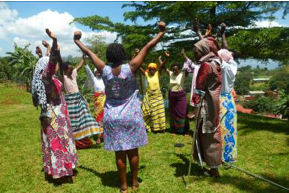
Continuing our series of articles from our Annual Report 2024/25, we outline here our work on our Community Counselling Initiative.
Through counselling for women victims of genocide rape, Survivors Fund (SURF) and Foundation Rwanda have provided counselling in a well-structured peer support approach to over 850 mothers through our Community Counselling Initiative. Of these, a further 50 received counselling during 2024.
The project includes in-depth monitoring and evaluation, surveying the women before, during and after working in the counselling groups. This provides the ability to track the changes in their circumstances and monitor their wellness, whilst also providing feedback to ensure that the counselling groups are having a positive impact and are helpful to the women.
These women, who were previously marginalised, stigmatised and alone in their trauma, can build their confidence and self-esteem, increase their knowledge, enhance positive emotions and reduce shame. The counselling groups also helped to improve relationships with their children and family.
Since 2016, we have extended the approach of group counselling to develop community counselling for the children of the women survivors too, as youth born of rape face great challenges related to trauma and social stigma as well. They are described as carriers of “deviant genes” and are often marginalised in their families and communities. In instances occurring during wartime, many societies have adopted hateful labels such as “children of shame” or “children of bad memory”.
Many mothers are starting to speak out against the negative perceptions and stigma associated with children of rape and disclosing to their children the circumstances leading to their birth. Many mothers attest that after disclosure the children now youth, need psychological support.
The youth retreats in 2024 brought together 36 youth to receive group counselling, reproductive health training and career guidance. This has provided vital support and assistance otherwise unavailable to them.
M.G *
M.G. is a 46-year-old married woman living in the Rwinkwavu sector of Kayonza District. She is the mother of five children. Her eldest child was born as a result of rape during the 1994 Genocide against the Tutsi.
She shared: “Joining this group was the first time I met others who shared similar life experiences. For many years, I felt deep shame and avoided connecting with other genocide survivors because I had given birth to a child fathered by a perpetrator. I was often subjected to hurtful remarks about my child, which made me feel isolated and unworthy of belonging in survivor spaces. I struggled with sadness, insomnia, persistent headaches, and a constant tightness in my throat that I believed had caused a goitre.
Initially, I remained silent during group sessions, but as I listened to the stories of other women with similar experiences and pain, I slowly began to open up. It felt like a heavy burden was lifted from my heart – a heart that had held sorrow in silence for so long. I am deeply grateful for those who listened to me and accepted my story, however difficult it was to hear. This group not only supported me emotionally but also enabled my child – after 29 years of isolation – to connect with others who share a similar history.
I now have friends. I feel relief. I no longer have to carry these burdens alone, and I have learned that it is okay to seek help when I need it.
Participating in this group has helped me immensely. For the first time, I was able to publicly share my testimony during the 30th commemoration of the genocide. After years of silence, I can now speak about what happened. I had neglected my health and avoided seeking medical care, feeling as though death would be a release. But today, I am receiving treatment for goitre, and I have renewed hope. I have rediscovered a love for life. In short, I feel as though I have come back from the dead.”
